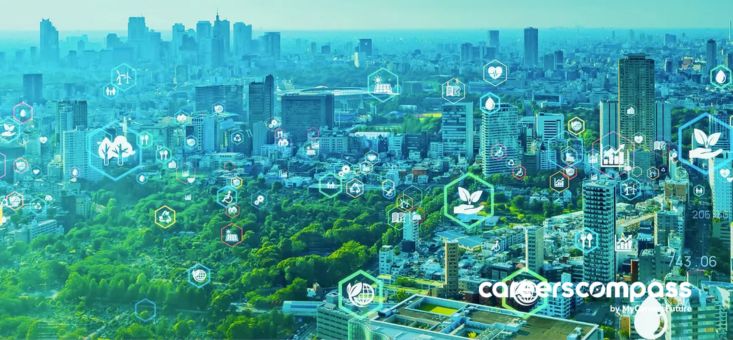Questions about the sustainability sector answered
- What is Singapore’s sustainability sector?
- Is the sustainability sector stable if you’re considering a mid-career switch?
- What kind of jobs are there in the sustainability sector?
- What’s the salary like?
- What are the growth areas in the sustainability sector?
- What courses or skills are needed to join the sustainability sector?
About Singapore’s sustainability sector
Since the launch of the Sustainable Singapore Blueprint, the sustainability sector in Singapore has grown significantly over the past decade, and the country has established itself as a hub for sustainable development in the Asia-Pacific region.
The Singapore Green Plan 2030 launch in 2021 aims to galvanise a pan-national movement and advance Singapore’s national agenda on sustainable development. Spearheaded by five ministries – the Ministries of Sustainability and the Environment (MSE), Trade and Industry (MTI), Transport (MOT), National Development (MND), and Education (MOE) – and supported by the entire government, it charts ambitious and concrete targets for the remainder of this decade.
Looking for a new role? Explore over 100,000 jobs available on MyCareersFuture now!
Size of the market
Under the Green Economy pillar of the Singapore Green Plan 2030, the country will undergo green growth opportunities to create new jobs and transform our industries. The Singapore Green Plan 2030 features five key pillars:
- City in Nature: Create a green, liveable and sustainable home for Singaporeans.
- Sustainable Living: Reduce carbon emissions, keep the environment clean and save resources and energy as a way of life in Singapore.
- Energy Reset: Use cleaner energy and increase energy efficiency to reduce Singapore’s carbon footprint.
- Green Economy: Seek green growth opportunities to create new jobs, transform Singapore’s industries and harness sustainability as a competitive advantage.
- Resilient Future: Build up Singapore’s climate resilience and enhance its food security.
Singapore has established several institutions and organisations to support sustainability efforts, such as the Singapore Green Building Council, which promotes green building practices, and the Centre for Sustainable Asian Cities, which researches sustainable urban development.
Singapore’s strategic location and reputation as a hub for sustainable development in the Asia-Pacific region have attracted international companies such as Schneider Electric, Vestas, and ENGIE have set up operations in Singapore to tap into the growing demand for sustainable solutions in the region.
Why is this sector important to Singapore’s economy?

In the face of the climate crisis, Singapore aims to harness sustainability as a competitive economic advantage. Many economic opportunities can arise from the overall transition to a low-carbon economy.
1. Environmental goals
Singapore is committed to sustainable development and reducing its carbon footprint. Adopting green technologies supports these goals, helping mitigate climate change and improve environmental quality.
2. Economic diversification
Investing in green technologies diversifies Singapore’s economy, reducing reliance on traditional sectors and fostering innovation. This is crucial for maintaining economic resilience and competitiveness.
3. Job creation
The sustainability sector creates new jobs in areas such as renewable energy, sustainable construction, and environmental management. This supports employment and skill development in emerging fields.
4. Global leadership
By positioning itself as a leader in sustainability, Singapore can enhance its global reputation, attract international investments, and foster partnerships that drive technological advancements and economic growth.
5. Regulatory compliance
Stricter environmental regulations globally necessitate compliance with sustainability standards. By advancing in green technologies, Singaporean companies can better navigate these regulations and gain a competitive edge internationally?
Growth areas and outlook of the sustainability sector
The sustainability sector in Singapore is projected to continue growing in the coming years, driven by the country’s commitment to sustainability and the growing demand for sustainable solutions in the region. The Green Plan will strengthen ongoing national sustainability efforts and mitigation measures with several new initiatives and targets. These include:
- A new Enterprise Sustainability Programme to help Singapore enterprises to develop sustainability capabilities
- Requiring all new car registrations to be cleaner-energy models from 2030 and more than double the targeted number of electric vehicles (EVs) charging points by 2030, from 28,000 to 60,000
- Raising the sustainability standards of our buildings through the next edition of the Singapore Green Building Masterplan
- Building on our 2030 aim to reduce the waste sent to our landfill by 30%, we will work on achieving a 20% reduction by 2026
- Working towards a two-thirds reduction of net carbon emissions from the school sector by 2030, and aiming for at least 20% of our schools to be carbon neutral by 2030 for a start, with the rest to follow after
Driving the growth of Singapore’s sustainability sector is the increasing awareness and demand for sustainable solutions among consumers and businesses. This trend has led to new companies and startups offering sustainable alternatives to traditional products and services.
Mid-career switch: Why is the sustainability sector a good choice?

Jobs in the sustainability sector are multi-disciplinary. This broad scope offers a fertile ground for applying your existing skills. The Green Plan 2030 outlines the government’s goals for a sustainable future, focusing on energy efficiency, water conservation, waste reduction, and green spaces.
The Singapore government is increasing its push for sustainable development by supporting workers and employers looking to participate in the green revolution. This shift helps safeguard the climate while capitalising on Asia’s regional growth, and the low-carbon future presents fascinating career opportunities for jobseekers.
MSE estimated that the sustainability sector — including the agritech and waste management industries — is expected to add 55,000 new and upgraded jobs.
What are the types of jobs and what is the salary like in the sustainability sector?
Green jobs are not just about cleaning or recycling. They span a wide range of industries, including energy, finance, fashion, and transportation.
Speaking at a virtual dialogue session titled “Climate Action: Emerging Stronger From a Crisis,” Minister for Sustainability and the Environment Grace Fu said the sustainability sector was “very exciting” and had many gaps to be filled.
“When you notice there are gaps, you know that you need to fill the gaps, and I think that’s exactly where we think this is a new sector where jobs are going to grow – and good jobs as well,” said Ms Fu.
Here are some examples listed on the MyCareersFuture portal:
| Role | Salary Range |
| Sustainability Project Manager | $5,000 to $8,000 |
| Associate, Environment Sustainability Design | $7,000 to $9,000 |
| Sustainability and Supplier Development Specialist | $6,000 to $9,000 |
| Sustainability & Climate Change Specialist | $3,000 to $3,300 |
| Executive, Infrastructure & Sustainability | $2,800 to $4,000 |
| Project Manager, Sustainable Energy (Marine) | $6,000 to $7,000 |
| Researcher (Sustainability) | $4,000 to $5,000 |
| Head Sustainability | $15,000 to $21,000 |
| Sustainability Consultant | $4,000 to $5,500 |
| Regional Sustainability Lead | $11,500 to $14,500 |
What courses or skills are needed to join the sustainability sector?
Jobseekers or mid-career switchers keen on joining the sustainability sector can up their chances of landing a job by upskilling themselves. WSG offers a Career Conversion Programme (CCP) for Sustainability Professionals.
As a CCP participant, you will undergo structured On-the-Job Training (OJT) at a sustainable company. Once you’ve completed the CCP, you will be equipped with the necessary competencies and skills to take on sustainability-related job roles within the company.
If you need professional advice on navigating your career journey to the sustainability sector, register here to speak to a career coach! Here is some useful reading to help you learn more about the sustainability sector.
Salary Guide Singapore 2023: Agritech Industry
5 Reasons Why You Should Consider a Career in Sustainability
5 Sustainability Development Career Paths to Consider
The Future of Sustainable Work: Green Sector Jobs to Consider
What Do I Need Before Starting a Career in the Sustainability Sector
How to Succeed in the Sustainability Industry with No Prior Experience
How to Start Your Career as a Sustainability Analyst
Going Green: How Singapore Companies Can Make the Change
Sustainability: How ESG Development Goals Can Attract & Retain Talent
Go Green! 5 Local Startups With a Sustainable Soul
How Singapore Businesses Can Kickstart Their Sustainability Journey
Breaking New Grounds: Singapore’s Very Own Captain Planets
Journeys of Resilient Companies: Sustenir Group, an Urban Farm Rooted in Singapore
Sustainability Jobs in the Built Environment Sector: The Future of Sustainable Work















